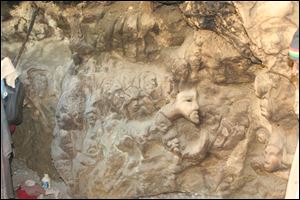
COMMENTARY
Health professionals talk shop amid appreciation of Jamaica
2/18/2013
A rock carving by a Jamaican artist is part of a roadside gallery.
OCHO RIOS, Jamaica — Each winter, when cold weather overwhelms the senses and cabin fever begins to set in, a group of Toledoans — members of the Academy of Medicine of Toledo and Lucas County — head south for a week of sun, sand, and fellowship. The trip also involves three days of intensive continuing medical education.
With few exceptions, the academy has held these winter seminars since 1972. This year, we traveled to Ocho Rios Sandals resort, along the northern coast of Jamaica.
After 300 years of British colonial rule, Jamaica became independent in 1962. It is now a parliamentary democracy and, as in Canada and Australia, Queen Elizabeth still is its titular head of state. The current prime minister, Portia Simpson-Miller, is the first woman to head the country.
Three centuries of colonial rule have left an indelible mark on Jamaican culture and traditions. Jamaicans drive on the left side of the road. Even though they adopted the metric system some time ago, pounds and miles remain part of the vocabulary.
Deeply rooted Christianity and the game of cricket are other legacies of the British. Roman Catholicism, however, arrived earlier, with the Spaniards.
It is often said that Jamaica has more churches for the size of its population than any other country. People also hasten to add that the number of churches is exceeded only by the number of bars.
On a recent Sunday afternoon, while I was walking in the small town of Ocho Rios (Spanish for “eight rivers”), I was attracted to loud singing in a Pentecostal church. Men, women, and children, dressed in their Sunday best, were singing hymns and devotional songs and undulating rhythmically to the beat of the island music.
The music and singing were as electrifying as the African-American church music of our Southern states. Once you hear it, it attracts and envelops you.
Though Christianity is the dominant religion and almost all Christian denominations are represented in Jamaica, there are also Bahais, Jews, Buddhists, Hindus, and Muslims.
And then there are the Rastafarians, who took their start in Jamaica in the 1930s. They worship Haile Selassie, who ruled Ethopia for 45 years until his death in 1975. He is considered the reincarnation of Jesus Christ. The late Bob Marley, the Jamaican reggae singer, was a Rastafarian.
While English football — which we call soccer — is popular, cricket invokes the most passion among Jamaicans. The national team is drawn from 15 English-speaking islands in the Caribbean.
The team won two world titles, in 1975 and in 1979, and was near the top of world ranking until the 1990s. Jamaicans still talk about the cricket legends who brought fame and glory to their island.
Art is everywhere. Roadside stalls and emporia abound with cheap and not-so-cheap handcrafted objects made from wood, coconut shells, and tree bark. There is jewelry of all kinds. Mercifully, I did not see a single “Made in China” label on Jamaican handicrafts.
I saw an older man carving island scenes on pieces of green bamboo. Using a paring knife with fluidity, he carved swaying palm trees and birds in flight.
Driving in the hills of Ocho Rios, I saw a wide shallow cave on the side of the road. An elderly Jamaican, using a chisel, hammer, and pick, was carving human figures and scenes in the rock.
His roadside gallery was meant for others to enjoy. He wanted to leave the carvings as his gift.
Young people in Jamaica live in the present and appear to be unaware of their nation’s past. I asked a young woman about some of the great Jamaican musicians. She mentioned Mr. Marley. She had not heard of Harry Belafonte.
Mr. Belafonte has lived in America except for eight years of his early life, when he lived with his grandmother in Jamaica. His music was inspired by the sounds, sights, and fragrance of the country. He gave us such immortal songs as Banana Boat, Kingstown Town, and Jamaica Farewell.
It was a week well spent.
Dr. S. Amjad Hussain is a retired Toledo surgeon whose column appears every other week in The Blade.
Contact him at: aghaji@bex.net